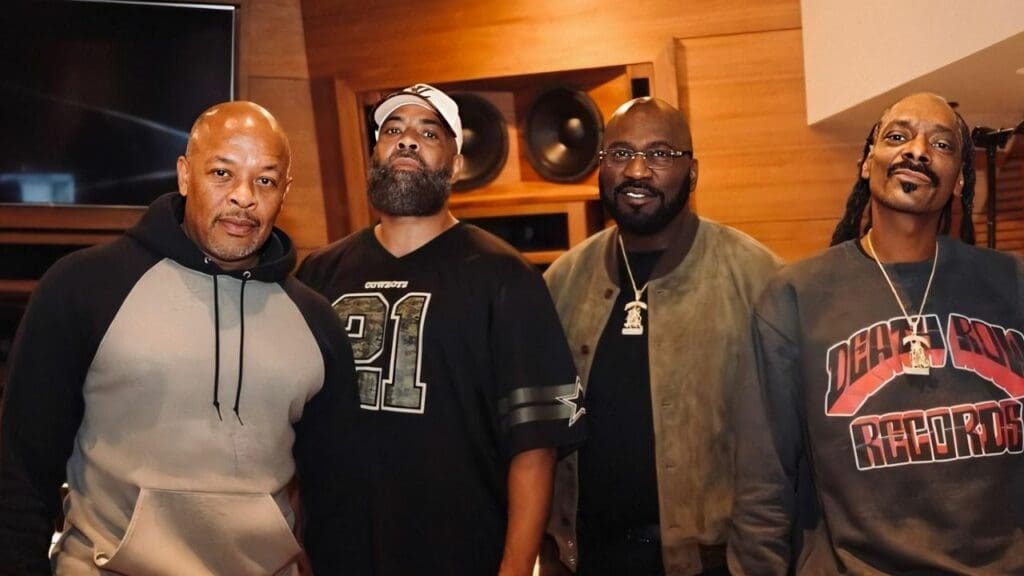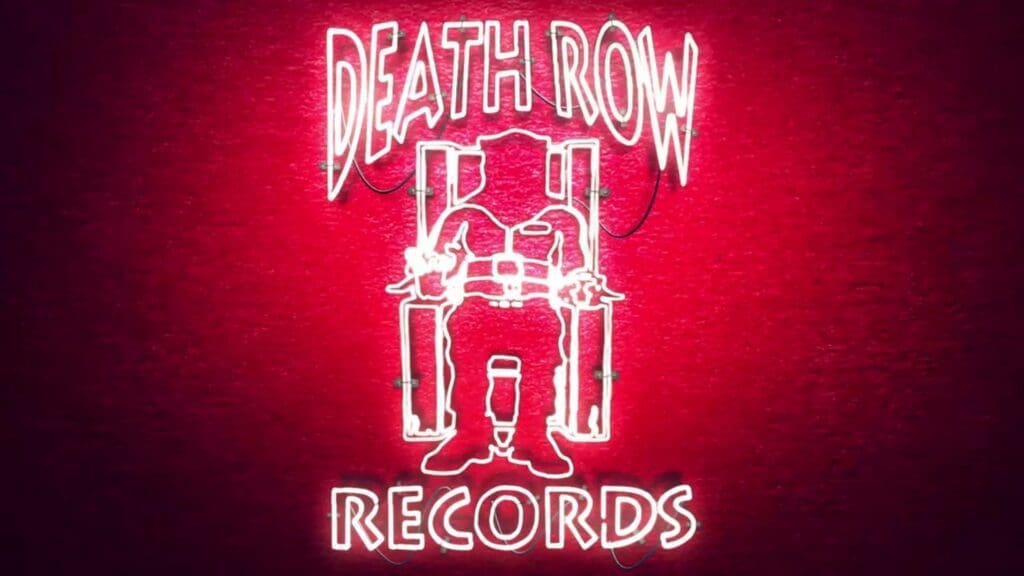
Despite listening to predominantly Rock and Metal, even I haven’t escaped the remarkable maw of Death Row Records and its incredible legacy.
This article will provide an overview of Death Row Records, a prominent record label in the hip-hop industry. It discusses the history of the label, which was founded by Suge Knight in 1991 and became known for its hard-hitting West Coast sound and talented roster of artists. The article also highlights some of the notable artists who were signed to the label, including Dr. Dre, Snoop Dogg, Tupac Shakur, and some of the notable albums that were released under the label.
Despite its early success, the label struggled with financial and legal issues, and many of its top artists left for other labels. The legacy of the label, however, continues to inspire new generations of artists and fans, and the label remains an important part of the history of hip-hop culture.
History of Death Row Records
Death Row Records was a record label that played a monumental role in shaping the sound of hip-hop music in the 1990s. The label was founded in 1991 by Marion “Suge” Knight, who was a former bodyguard for rapper and producer Dr. Dre. Knight’s vision was to create a record label that would represent the hip-hop scene and showcase its unique sound and talent.
The label’s first release was the album “Chronic” by Dr. Dre, which was a massive success and went on to sell over 5 million copies. The album featured the signature West Coast sound of G-funk, which was characterised by its heavy basslines, synthesiser melodies, and laid-back beats. It also introduced a new generation of rappers and producers to the mainstream, including Snoop Dogg, Warren G, and Nate Dogg.
In 1993, the label released Snoop Dogg’s debut album, “Doggystyle,” which was another massive commercial success, selling over 11 million copies worldwide. The album was produced by Dr. Dre and featured the hit singles “Gin and Juice” and “Who Am I (What’s My Name)?”
Throughout the 1990s, it continued to dominate the hip-hop scene, releasing a string of classic albums that helped define the sound of rap. The label’s roster of artists included some of the most iconic and influential figures in the history of hip-hop, including Tupac Shakur, and Dr. Dre.
However, the label was plagued by legal troubles and financial problems. Suge Knight’s confrontational management style and alleged involvement in criminal activities led to numerous legal battles and arrests. The label’s success began to wane in the late 1990s, and many of its top artists left for other labels.
In 1996, Tupac Shakur was shot and killed in Las Vegas, dealing a devastating blow to the label. The label’s financial struggles continued, and it eventually declared bankruptcy in 2006.
Despite its troubled history, Death Row Records remains a significant and influential force in the hip-hop industry. The label’s contributions to the development of rap and the careers of its legendary artists continue to inspire new generations of musicians and fans alike.
Notable Artists of Death Row Records
The label became a home to some of the most talented and influential artists in the history of hip-hop. These artists helped define the label’s signature sound, which blended funk, soul, and gangsta rap to create a unique and powerful style that dominated the genre in the 1990s.
One of the most prominent figures associated with Death Row Records was Dr. Dre. Not only was he the founder of the label, but he was also one of the most important producers and rappers of his generation. Dr. Dre’s work on albums like “The Chronic” and “2001”.
Everybody knows Snoop Dog. Even today, he’s become a bit of a social media icon. His debut album, “Doggystyle,” was released in 1993 and became an instant classic, featuring hit singles like “Gin and Juice” and “What’s My Name?” Snoop Dogg’s laid-back flow and unique style helped cement his place as one of the most successful and beloved rappers of all time.
Tupac Shakur was yet another iconic artist associated with the label. He released several albums on the label, including “All Eyez on Me” and “The Don Killuminati: The 7 Day Theory.” Tupac’s music is renowned for its raw and emotional power, and his lyrics often dealt with themes of social justice and the struggles of life on the streets.
The D.O.C made an impressive impact during his time with Death Row. He was a close collaborator of Dr. Dre and released his debut album, “No One Can Do It Better,” on Ruthless Records in 1989 before signing with the label. The D.O.C’s talent for writing and performing was widely recognised, and he also helped shape the sound of the label during its early years.
Crooked I was a member of the supergroup Slaughterhouse and released several solo albums. He is praised for his technical skill and his ability to tackle complex and controversial topics in his lyrics.
Michel’le was a singer and actress from Compton who was best known for her hit single “No More Lies.” She was one of the few female artists on the roster and was well-known for her powerful vocals and soulful style.
Hailing from Chicago, Danny Boy was best known for his collaborations with Tupac Shakur. He was featured on several of Tupac’s songs, including “I Ain’t Mad at Cha” and “Picture Me Rollin’.”
RBX was a rapper from Long Beach who released his debut album “The RBX Files” in 1995. He was known for his distinctive voice and his collaborations with other artists under the label.
Warren G also helped shape the sound of hip-hop. He is best known for his hit single “Regulate” and his collaborations with Nate Dogg.
Kurupt was another rapper who made a significant impact during his time with Death Row, both as a solo artist and as a member of the duo Tha Dogg Pound.
Nate Dogg was a singer and rapper known for his smooth vocals and collaborations with Warren G, Snoop Dogg, and Dr. Dre.
Lady of Rage was another of the few female artists on the roster and is known for her distinctive flow and formidable lyricism.
Notable Albums of Death Row Records
Death Row Records is recognised as releasing some of the most influential and groundbreaking albums in the history of hip-hop. These albums helped skyrocket Death Row’s popularity and inspired countless artists and fans around the world. Here are some of the most notable albums released by the label:
All Eyez on Me by Tupac Shakur (1996) – This double album was one of the most anticipated and successful releases in hip-hop history. It featured hits like “California Love” and “How Do U Want It” and cemented Tupac Shakur’s place as one of the greatest rappers of all time.
The Don Killuminati: The 7 Day Theory by Tupac Shakur (1996) – Released under the name Makaveli, this album was recorded in the months leading up to Tupac’s death and is widely regarded as one of his best and most controversial works.
The Chronic by Dr. Dre (1992) – Dr. Dre’s debut solo album was a landmark in the history of hip-hop and helped establish the label as a powerhouse in the industry. It featured classics like “Nuthin’ but a G Thang” and “Dre Day.”
Doggystyle by Snoop Dogg (1993) – Snoop Dogg’s debut album was a huge commercial success and featured some of his most iconic tracks, including “Gin and Juice” and “Who Am I (What’s My Name)?”
Tha Doggfather by Snoop Dogg (1996) – Snoop Dogg’s second album features production from Dr. Dre and was another commercial success for Death Row. It includes tracks like “Snoop’s Upside Ya Head” and “Up Jump Tha Boogie.”
2001 by Dr. Dre (1999) – Dr. Dre’s second solo album, “2001” was a critical and commercial success and featured collaborations with Snoop Dogg, Eminem, and Xzibit. It includes tracks like “Still D.R.E.” and “The Next Episode.”
R U Still Down? (Remember Me) by Tupac Shakur (1997) – Another posthumous release from Tupac Shakur, “R U Still Down?” features previously unreleased material from throughout his career. It includes tracks like “I Wonder If Heaven Got a Ghetto” and “Do for Love.”
The Great Adventures of Slick Rick by Slick Rick (1988) – Although it was released before Death Row Records was founded, “The Great Adventures of Slick Rick” was reissued by the label in 1995 and is considered a classic of hip-hop. It includes tracks like “Children’s Story” and “La Di Da Di.”
The Financial Struggles of Death Row Records
While Death Row Records enjoyed immense success during its heyday in the 1990s, the label had financial struggles that ultimately led to its downfall. One of the primary factors contributing to Death Row’s financial problems was the lavish spending of its founder, Suge Knight. Knight was known for his extravagant lifestyle and his willingness to spend large amounts of money on luxury cars, jewellery, and other indulgences.
Another factor that contributed to Death Row’s financial troubles was its legal battles. The label was involved in a number of high-profile lawsuits, including a lawsuit brought by Dr. Dre over unpaid royalties and a lawsuit brought by the family of a man who was killed in a brawl at a Death Row party.

Death Row’s financial struggles also impacted its ability to promote and distribute its artists’ music. In 1996, the label was forced to declare bankruptcy after it was unable to pay a $107 million judgement to the family of the man who was killed at the party. This bankruptcy had a ripple effect on the entire music industry, as it impacted the release and distribution of albums by Death Row artists and caused other labels to become more cautious about signing hip-hop artists.
Despite these challenges, Death Row continued to release music and sign new artists. However, the label’s financial struggles made it increasingly difficult to maintain its position as a leader in the hip-hop industry. In 2006, Death Row was sold to WIDEawake Entertainment, a company that specialises in buying and reissuing old music catalogues.
Today, Death Row Records is remembered as one of the most important and influential labels in the history of hip-hop. While its financial struggles and legal troubles inevitably led to its demise, the music and legacy of Death Row continue to inspire and influence new generations of artists and fans.
The Legacy of Death Row Records

Death Row Records will always be remembered as one of the most innovative and influential labels in the history of hip-hop. Founded by Dr. Dre and Suge Knight in 1991, the label’s unique sound and roster of talented artists helped shape the course of the genre in the 1990s and beyond.
The legacy of Death Row Records can be seen in the countless artists who were inspired by the label’s sound and style. From Kendrick Lamar to Kanye West, the influence of Death Row can be heard in the work of some of the most successful and respected hip-hop artists of the 21st century.
The label’s impact on the music industry was also profound. Death Row helped elevate hip-hop to a new level of mainstream success and helped break down barriers for artists of colour in an industry that was often dominated by white executives and producers. The label’s success paved the way for other independent hip-hop labels and helped usher in a new era of artistic freedom and creativity in the genre.
Despite the label’s financial struggles and legal battles, the music of Death Row Records continues to inspire and resonate with fans around the world. Classics like “The Chronic,” “Doggystyle,” and “All Eyez on Me” remain some of the most celebrated and revered albums in the history of hip-hop, and the artists who made them continue to be remembered as some of the most talented and influential figures in the genre.
The legacy of Death Row Records is a testament to the power of hip-hop as a cultural force and a reflection of the enduring impact of the label’s sound and style. While the label may be gone, its music and legacy continue to inspire new generations of artists and fans, ensuring that the influence of Death Row Records will be felt for years to come.










